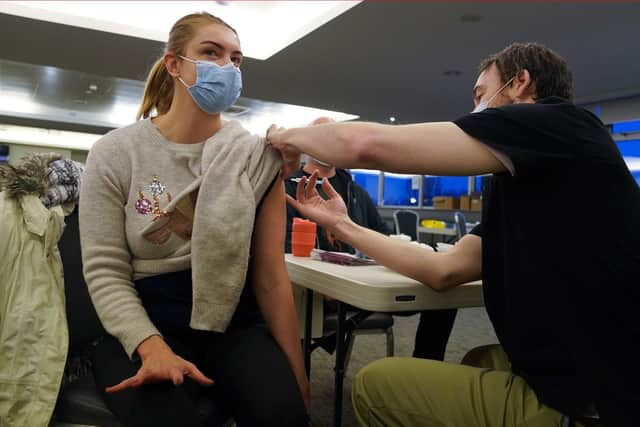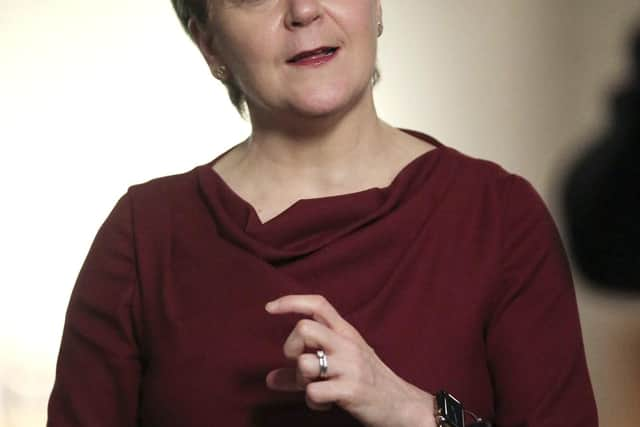Covid Scotland: Changes to isolation rules to be announced next week as Nicola Sturgeon accused of 'indecision'
and live on Freeview channel 276
Ms Sturgeon warned that the period ahead “will not be an easy one” as she revealed a jump in the number of positive cases to 15,849 yesterday.
Speaking at a virtual meeting of the Scottish Parliament, Ms Sturgeon indicated that changes could be made to the rule which requires household members of anyone with a positive Covid case to self isolate and said that ministers would also consider shortening the isolation period for people with a positive test. Any changes would take effect from 6 January.
Advertisement
Hide AdAdvertisement
Hide AdBut opposition leaders said the Scottish Government needed to urgently set out any changes to the rules, pointing to major staffing problems in the hospitality sector, as well as the NHS.


Priority for Covid testing, meanwhile, is to be given to key workers and vulnerable people amid reports that test centres and online orders of PCR and lateral flow tests have been overwhelmed by demand. Ms Sturgeon said that testing capacity in Scotland had reached 85 per cent yesterday, which would put pressure on turnaround times. Some people have reported waiting four days for a test result.
The number of new cases at 15,849 is a stark increase on those of previous days, while test positivity was at 28.9 per cent, which the First Minister said could be due to “people being more selective about when to go for the test over the Christmas period”. The last highest case tally was on Boxing Day, when 11,030 people tested positive.
However, Ms Sturgeon said that there was “optimism” over a lower number of hospital admissions linked to the new omicron variant. The Scottish Government is to undertake research into detailed breakdowns of how many people are currently in Scotland with the virus – but being treated for other reasons and those who are in hospital due to Covid. She said 679 people were in hospital with Covid – an increase of 80 - and 36 people are in intensive care.
Advertisement
Hide AdAdvertisement
Hide AdMs Sturgeon told MSPs that there would be no change to restrictions on hospitality businesses, such as the closure of nightclubs, the reintroduction of social distancing in restaurants and bars and tight number restrictions on events – which will stay in place until 17 January.


She said: “There's no doubt that the the data we are looking at most closely just now is the conversion of positive tests into hospital admissions. And there are here some grounds for optimism. Over the past week published studies have suggested that the risk of hospitalisation for omicron is lower, possibly significantly lower than for other strains of the virus. What is not yet to be understood is why this might be the case.”
She added: "This situation we face now is not what any of us want. And the period immediately ahead will not be easy. That said, I hope the clearer picture we will have in the next couple of weeks will also prove to be a much more positive picture.”
Ms Sturgeon said that any changes to isolation rules would be considered over the next week and implemented from 6 January.
Advertisement
Hide AdAdvertisement
Hide AdScottish Conservatives leader Douglas Ross pointed to a recent study into Omicron which he said demonstrates “how it's more transmissible, but is less severe”.
She said: “I indicated last week that we were weighing the risks and benefits of shortening the isolation period for index cases and also potentially easing the requirement for all household contacts to isolate following a positive case. These are finely balanced judgements and we are considering the current trends in infection carefully. However, I can confirm that we do hope to reach decisions in the next week with any changes taking effect from the sixth of January and we will keep Parliament updated.”
Mr Ross said: “Last week I asked the First Minister to change self-isolation rules to allow household contacts to end self-isolation if they have a negative PCR test, and to reduce isolation from ten to seven days if they test negative twice. But her message to people is, once again, to tune in again next week on these essential changes.”
He added: “Businesses across Scotland are struggling - at what should be their busiest time of year - with both the impact of restrictions and the First Minister’s indecision on self-isolation rules.
Advertisement
Hide AdAdvertisement
Hide Ad“Absences and a lack of staff cover mean many are having to close early or are unable to open at all, despite staff testing negative for Covid. On top of that, many businesses that are in dire straits and need financial support now have still not received financial support from the Scottish Government.”
Scottish Labour leader Anas Sarwar said after the update: “When so many of us have spent the last few days enjoying Christmas with our friends and families, our frontline workers have worked tirelessly to keep us all safe and secure – but staff absences are spiking and the disruption to vital public services is rising.
“The First Minister must set out what scientific evidence she is relying on to justify delaying making any changes to self-isolation rules. Every restriction has a knock-on effect for workers and businesses, particularly in hospitality and retail."
He added: “We know that testing is the key to breaking transmission. From lateral flow tests before visiting friends and family, to the PCR tests which determine the spread and pace of this virus – it is the core of a successful response. But across Scotland that system is showing signs of strain.
Advertisement
Hide AdAdvertisement
Hide Ad“Far too many people trying to get tested are faced with shortages, long journeys, and lengthy waits for their results. At some moments through this break people have reported that they cannot book tests for delivery online. This is piling more disruption on businesses and public services, and distracting frontline workers from their responsibilities – putting livelihoods at risk. With Hogmanay approaching, the First Minister must take action to increase testing capacity, availability and speed of results.”
The First Minister told Holyrood that 75 per cent of those eligible for a booster vaccination in Scotland have now received one – and said that capacity was available in the system for everyone who could have a third vaccination to have one by the end of this week.
However, she said that while rates of cancellation and failure to attend had increased in the past week, she believed said that was mainly down to higher numbers of people being infected with the virus, which makes them ineligible for vaccination for 12 weeks.
She said in previous waves of Covid-19, around 70 per cent of people in hospital who had tested positive for Covid were there because of the virus. The government is to publish a full breakdown of Omicron cases in hospital over the next couple of weeks – including whether hospital stays are generally shorter with Omicron, as has been suggested in other countries.
Advertisement
Hide AdAdvertisement
Hide AdShe said: “We do want to understand that breakdown with Omicron and we will look to publish those figures.”
During the update, the First Minister detailed the allocation of the first £100 million of support for businesses affected by the recent restrictions.
A total of £16m will be made available to support public transport providers through existing Covid support schemes, £27m will go to the culture sector, and a further £17m will be given to the events sector. Meanwhile, £32m will be allocated to hospitality and leisure businesses, with an additional £10m for those parts of the hospitality industry most severely impacted by the requirement for table service. Nightclubs, which have been required to close, will be given up to £5m.
Scottish Liberal Democrat leader Alex Cole-Hamilton said: “I met with the hospitality sector last week and they told me that the money on offer at the moment represents just 1/8th of their January payroll. It will barely last them three days. Today’s 16,000 cases will leave them in serious doubt that they’ll be allowed to reopen on the 17th of January. Many businesses are on the verge of making irreversible decisions and people are losing their jobs.
Advertisement
Hide AdAdvertisement
Hide Ad“It is clear that the First Minister, if her government chooses to extend restrictions beyond the 17th, needs to offer reassurance that further support will be made available to a hospitality sector already on its knees.”